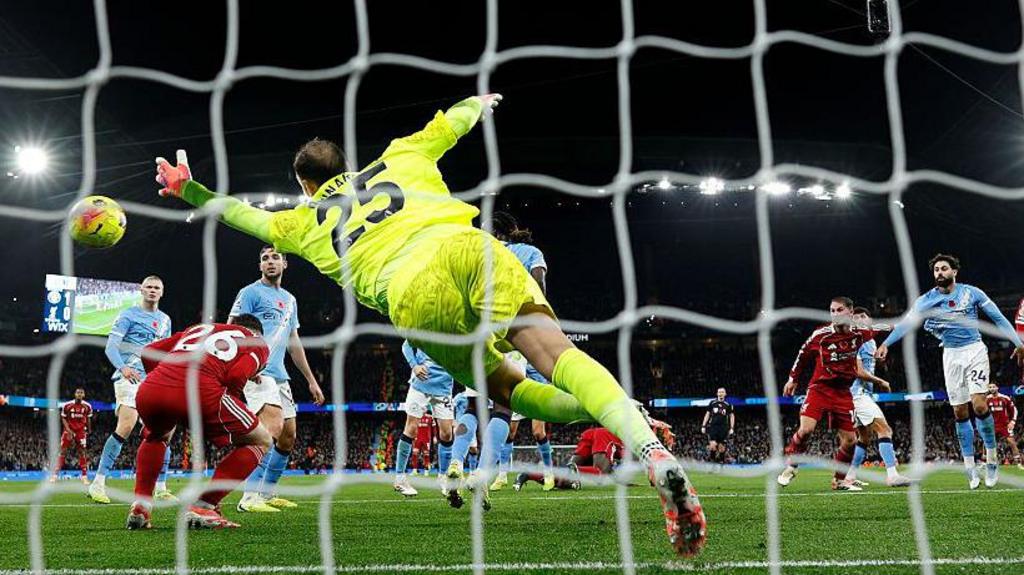This video can not be played
Van Dijk goal against Man City ‘should have stood’ – Rooney
Premier League referees’ chief Howard Webb has stated that it was “not unreasonable” to disallow Virgil van Dijk’s goal against Manchester City on Sunday due to an offside ruling.
Van Dijk’s apparent equalizer for Liverpool in the 38th minute was overturned when referee Chris Kavanagh, with assistance from Stuart Burt, determined that Andrew Robertson was in an offside position and had interfered with play by ducking under the ball’s trajectory, potentially impacting goalkeeper Gianluiga Donnarumma.
The Video Assistant Referee (VAR), Michael Oliver, reviewed the incident and upheld the on-field decision, contributing to Manchester City’s eventual 3-0 victory.
On Monday, Liverpool reportedly contacted the Professional Game Match Officials (PGMO), the organization responsible for overseeing refereeing in English professional football, to express their concerns. Liverpool argued that the criteria for disallowing the goal were not met and that the goal should have been allowed.
Liverpool believed they had leveled the score at the Etihad Stadium, but ultimately suffered a 3-0 defeat.
Webb addressed the controversy on the Match Officials Mic’d Up show, acknowledging that differing opinions existed but maintaining that valid justifications supported the decision to disallow the goal.
“Determining interference by an offside player who does not play the ball, where officials must judge the impact on an opponent, presents some of the most subjective decisions we face,” Webb explained.
“Therefore, it is understandable that some believe the goal should have stood. It is crucial to examine the facts of the situation.”
“During the corner kick, as the ball approaches Van Dijk, Manchester City players move out, leaving Robertson in an offside position near the six-yard box.”
“The pivotal moment for the offside judgment is when Van Dijk heads the ball forward and pertains to Robertson’s actions.”
“While Robertson does not touch the ball, he makes a clear action to duck below it as it approaches him, just three yards from the goal in the middle of the six-yard box.”
“The officials then judged whether Robertson’s action impacted Donnarumma’s ability to save the ball, which is where subjectivity comes into play.”
“That was the conclusion they reached based on Robertson’s position and action so close to the goalkeeper.”
“Although not universally held, understanding their reasoning is not unreasonable.”
“Given Robertson’s proximity to the goalkeeper and his ducking action to avoid the ball, officials concluded that it impacted Donnarumma’s ability to dive and make the save.”
“Following the on-field decision, VAR’s role was to determine if the offside call was clearly and obviously incorrect.”
“Only Donnarumma knows if he was truly impacted. Considering the factual evidence of Robertson’s position and ducking action near the goalkeeper, VAR determined that the offside call was not clearly and obviously wrong and therefore did not intervene.”
‘Not about the line of vision’ – analysis
‘It can’t go on’ – how Liverpool’s tactics helped brilliant Doku run riot
Was it correct to disallow Liverpool equaliser?
Webb further clarified the various factors that officials considered.
“The assistant referee mentioned line of vision, which typically pertains to obstructing the view of the ball,” he noted.
“While Donnarumma had a clear view of the ball, the assistant also considered Robertson’s ducking action and proximity to the goalkeeper.”
“These factors, independent of line of vision, can be sufficient to penalize a player for offside by interfering with an opponent. Even if the goalkeeper sees the ball, the player’s position and ducking action can cause hesitation.”
“Goalkeepers rely on reactions for incredible saves, and the on-field judgment was that Robertson’s actions interfered. Therefore, beyond line of vision, other aspects can justify an offside call, which is why VAR did not overturn the decision.”
Liverpool manager Arne Slot drew comparisons to a Manchester City goal against Wolves last season, initially disallowed for a similar offside against Bernardo Silva but later awarded after VAR review.
“There is a clear distinction: the ball went directly over goalkeeper Jose Sa’s head, not over Bernardo Silva,” Webb clarified.
“Bernardo Silva was in an offside position when John Stones headed the ball forward, but he moved left, away from the ball’s trajectory. The ball went straight over Sa, unlike the situation with Robertson, who ducked below it.”
“Therefore, it is difficult to argue that Jose Sa was impacted by Bernardo Silva’s actions. Had the ball passed over Bernardo Silva’s head, potentially causing hesitation, the outcome might have been different, leading to VAR upholding the disallowed goal.”
Latest Liverpool news, analysis and fan views
Ask about Liverpool – what do you want to know?

